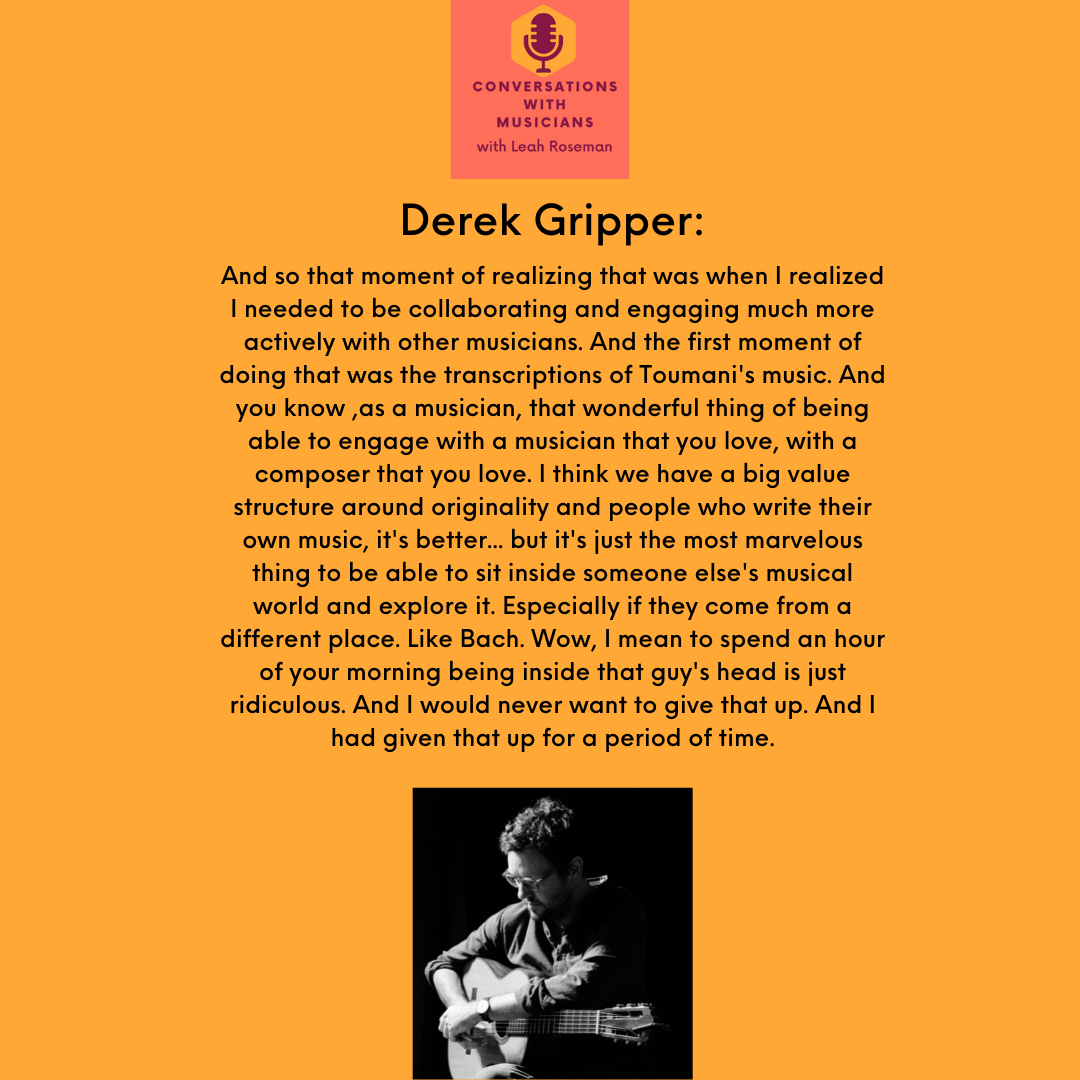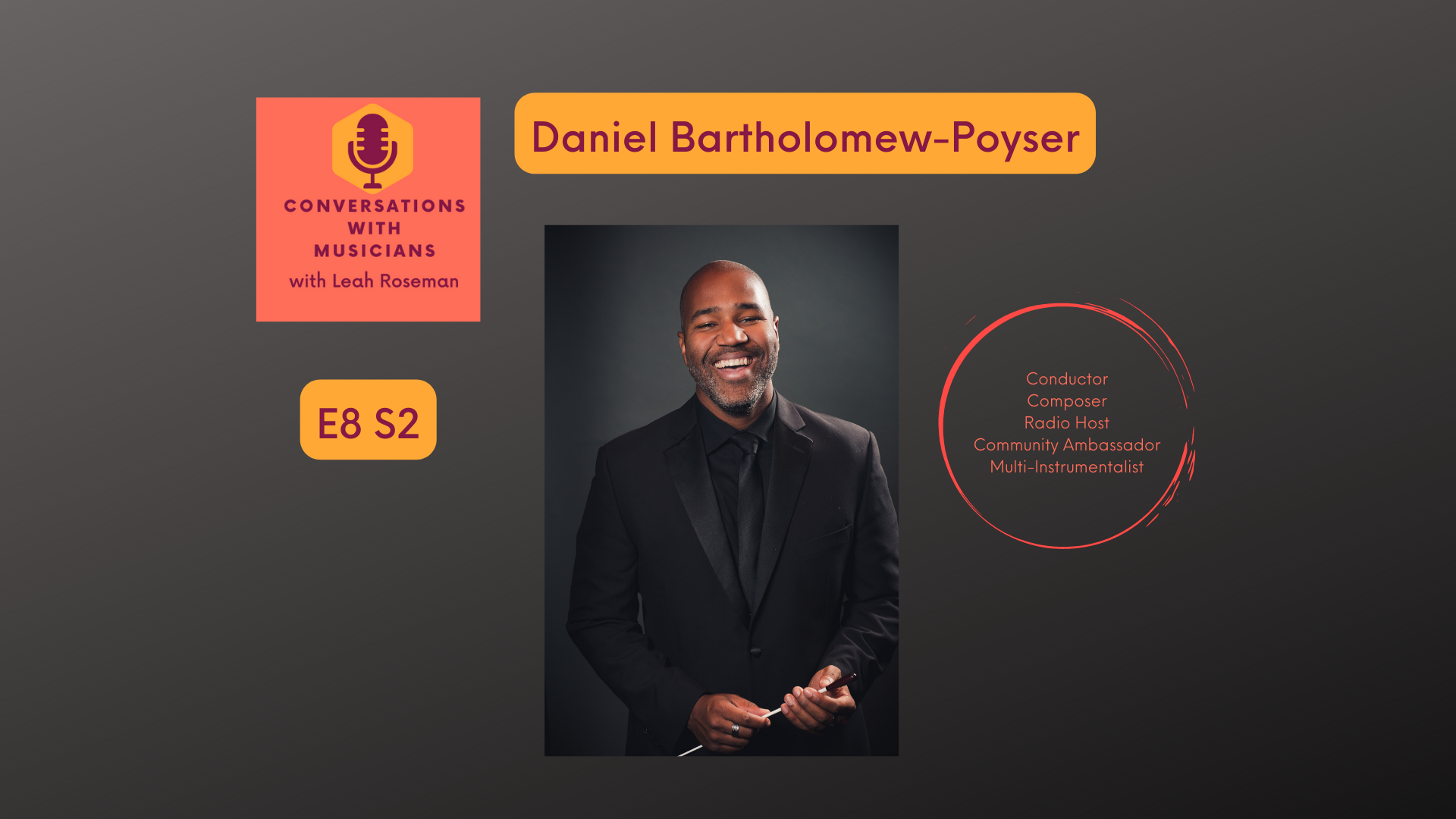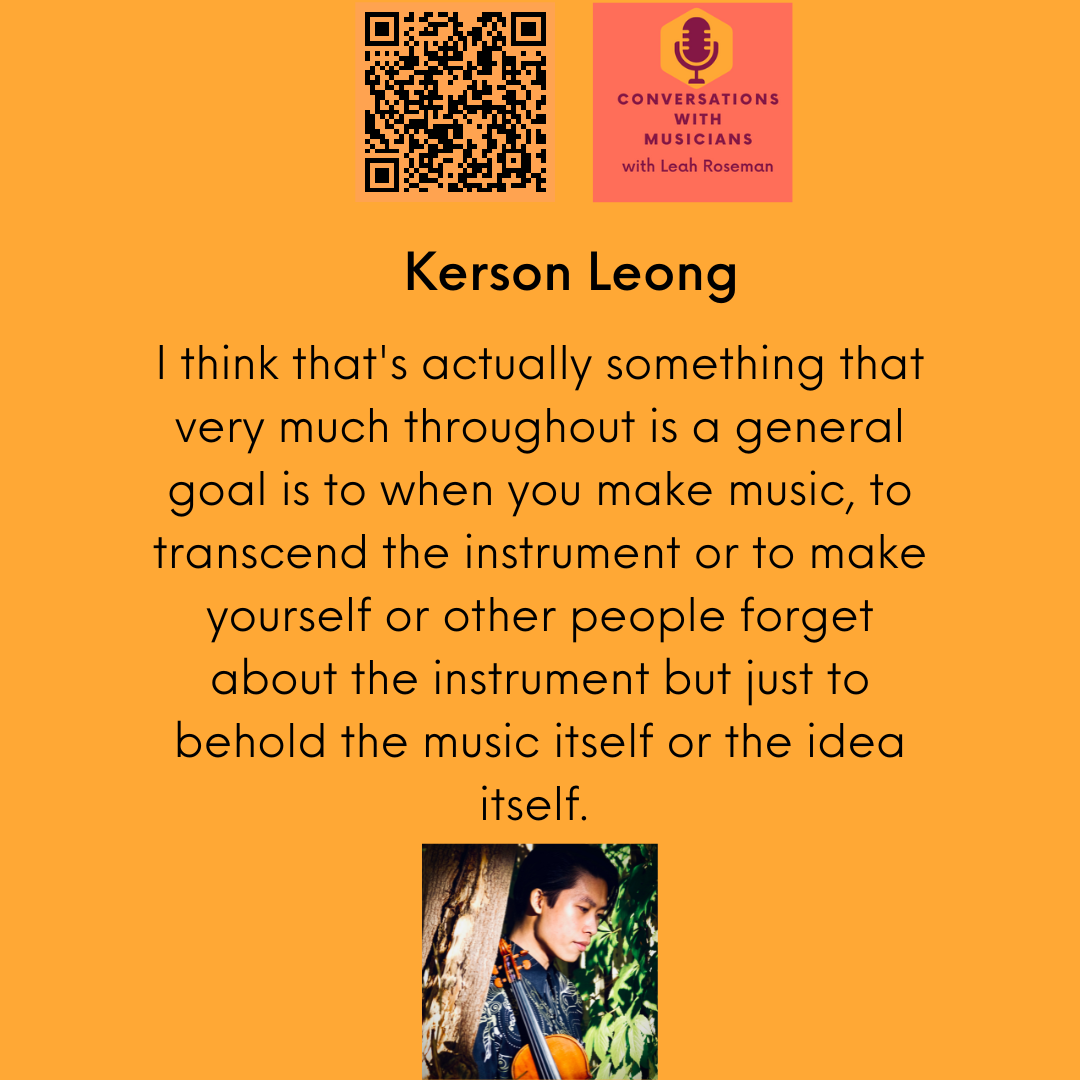Stephen Nachmanovitch: Transcript
Stephen Nachmanovitch is the author of both "Free Play" and more recently, "The Art of Is". This was an amazingly inspiring conversation, extremely wide-ranging, including some musical improvisation. I've included timestamps to help listeners navigate the many topics we touched on, including many important artists.
Leslie DeShazor: Transcript
Leslie DeShazor shares valuable perspectives that educators, parents and anyone who mentors children and young adults will find inspiring and thought-provoking. We talked a lot about why kids quit playing music, why so many young adults today have trouble figuring out the direction of their life, and how the educational system can take away people’s innate creativity and confidence. Leslie DeShazor is a multi-style violist, violinist and composer based in Detroit. She teaches students both through the Sphinx Organization and the Detroit Symphony as well as privately. She was named one of thirty Professional Movers and Shakers in the Performing Arts by Musical America in 2019 and in 2022 she released her jazz and R&B album “Journey With Me” which features herself as soloist, bandleader, and composer.
Derek Gripper: Transcript
The internationally renowned guitarist Derek Gripper is famous for his groundbreaking technique for evoking the West African kora on the guitar. This is the full transcript which is linked to both the podcast and video. Derek shares his wonderful insights on how we listen to and learn music, the influence of Montessori and Alexander Technique in his life, his reflections on important collaborations in his career and his perspectives on changes that have been imposed on creators and performers. He also plays guitar several times as part of the episode.
Elaine Klimasko
“Elaine Klimasko: “But I do say to all of my students though, if you think that playing in a symphony orchestra is secondary, that's the worst thing you could be thinking because the joy of orchestral playing, and I'm sure you feel the same way, Leah, is, there's nothing in life to me that compares with that. When you're playing one of those grand symphonies and that buildup a crescendo and you hear the horns and the French horns... I mean, I'm just covered in goosebumps. In my seventies still, and I don't know of any other profession that makes you feel that way. Maybe a doctor delivering a baby. I don't know. But it's pretty special.”
Gary Muszynski Transcript
This is a complete transcript of my conversation with Gary Muszynski, who is a versatile percussionist and entrepreneur. This episode delves into his experiences playing samba in Brazil, his discovery and exploration of the handpan, and some of his work as an educator in both community music projects and as an innovator using music in the corporate world. We also talked about his beautiful album Roots and Wings - Medicine Music, which won the Gold Medal Best of Show in the 2021 Global Music Awards and features 25 master musicians from 8 countries.
Aaron Schwebel: Transcript
Aaron Schwebel is a wonderful violinist, and has a lot of insight into the life of a musician. This is the full transcript of our conversation, which is available in both video and podcast formats, and there are bonus episodes that are linked as well.
Rachel Mercer: Transcript
Transcript of interview with cellist Rachel Mercer, with links to both podcast and video. In this conversation, we discuss the arc of her career so far as a chamber musician, soloist, principal cellist, the late Yehonatan Berick, an amazing violinist and pedagogue, who was her life partner, "Our Strength, Our Song" with her sister, the wonderful violinist Akemi Mercer-Niewöhner and many other chamber music collaborations and unique projects, as well as her way of approaching music. Rachel very generously made a special recording of the Prelude from J.S. Bach's fifth solo suite in C minor BWV 1011 and her heartfelt introduction to the power of this music is right after our conversation.
Karen Donnelly: Transcript
Full transcript of interview with the inspiring trumpet player and educator Karen Donnelly. Links for full and bonus episodes both podcast and video.
Daniel Bartholomew-Poyser: Transcript
I was really honoured to have this opportunity to sit down and talk with the dynamic conductor, composer, multi-instrumentalist and radio host of CBC's CentreStage, Daniel Bartholomew-Poyser. We explored many interesting and important ideas around creating spaces for diverse audiences, amateur versus professional musicians, LGBTQ rights, his project with the drag queen Thorgy Thor, the lost music of Florence Price, and wonderful advice not only for conductors, but for everyone seeking more balance and meaning in their lives. This is the full transcript of our conversation.
Kerson Leong: Transcript
This is the transcript of my in-depth conversation with virtuoso violinist Kerson Leong; it is linked to the podcast and video versions of the episode. I was thrilled to have this fascinating conversation with Kerson, who is as eloquent in his musicality as in the way he talks about music and violin playing. I trust that a broad audience will take inspiration from this wide-ranging discussion.
Julie Lyonn Lieberman: Transcript
Transcript for the in-depth interview with the multi-style violinist/vocalist, author, composer, producer and educator Julie Lyonn Lieberman.
Theo Marks Transcript
It's really interesting to hear about Theo Marks' unique upbringing in a family of musicians, and his personal journey to become a violin-family maker. Theo Marks: “ think if you just go through once and see the process from finish to end, you'll learn so much about how your violin functions. I mean, I can imagine that I barely was aware that I had a sound post in my cello, as a teenager, and that the fingerboard might need - that the arching of my cello was affecting its tone at the f-holes. You can so easily focus just on the technical aspects of playing. And I find now as a cellist I'm really enriched as a musician being more aware of how that wood is vibrating and what I'm hearing and how what I can do to affect that and how much is coming from the instrument itself.”
Shahriyar Jamshidi: Transcript
Full transcript of wide-ranging interview with Kurdish-Canadian Kamanche player, composer and improvisor Shahriyar Jamshidi, who grew up in Iran, and lived through some very difficult times. He has collaborated with many musicians including heavy-metal cellist Raphael Weinroth-Browne in their duo Kamancello, and has released numerous albums which feature his unique improvisational style. I find his playing to be extremely expressive and his personal story compelling. In this conversation he introduces us to this spiked-fiddle, which is the ancestor of the violin, and is used across many cultures, and also speaks about the need for humanity to stay in touch with our traditional music.
When I asked Shahriyar about his process of improvisation, he had this to say:
“Actually, it's hard to say that, but for myself you need, you need travel to where you love, like where you love. And for me, just, I am closing my eyes going to the, to my place, you know, you know, childhood time, the mountain, the place, I love it. And at this moment you try to just play music inside yourself”
Veronica Thomas Transcript E6 S1
Full transcript of my conversation with the engaging Veronica Thomas, a violinist, educator and General Director of the Preville Fine Arts Centre in Montreal. We talked about her unique and interesting childhood, and the wonderful and special work that the Preville Centre is doing, including their unique online offerings, the outreach they’ve been doing with remote Indigenous communities, and Veronica’s personal perspectives on her life in music. Included are links to the video, and podcast, with bonus episodes.
Josh “Socalled” Dolgin: Transcript
Complete transcript for wide-ranging interview with Josh “Socalled” Dolgin. We start with his remix of Curried Soul for CBC radio's daily show As It Happens, and circle around to topics including: sampling, Yiddish culture, changes in the industry from when he got his start selling CDs mail-order to touring internationally and collaborating with many musicians, including the funk legend Fred Wesley, David Krakauer, Kiran Ahulwalia, Itzhak Perlman, Theodore Bikel, writing musical theatre, puppets, art...here's a chance for all of us to get to know the creative force known as Josh "Socalled" Dolgin.
Alexis Chartrand E5 S1: Transcript
Full transcript of interview with traditional Québecois fiddler Alexis Chartrand, with links to video, podcast, and bonus episodes. In Episode 5, Season 1 of Conversations with Musicians with Leah Roseman, we get to hear some beautifully realized traditional tunes from Québec from traditional fiddler Alexis Chartrand. He talks about both groove and ornamentation in different traditional styles of fiddling. He talks very thoughtfully and about his background as a son of dancers, his explorations of tone colour with baroque violin, his upcoming performances at a number of festivals, and some of his musical influences and inspiration.
Alexis Chartrand: “I learned a lot from step dancers, listening to the sound of their feet, to the inherent groove that they've developed. To me that's really the basis of my practice of the bow, all of the rhythms that we have to summon with the traditional style of bowing. Personally is deeply, deeply related to the practice of step dancing in Quebec.”
Christopher Millard E5 S2 Transcript
Full transcript with podcast and video links for interview with renowned bassoonist Christopher Millard. We covered many fascinating topics, including: Advice for music students, the art of reed-making, the physics of sound production on bassoon and violin, the advantages of studying jazz, musicians' difficulty with retiring,Marcel Moyse, the legendary Flute teacher and mentor, World Orchestra for Peace with Gergiev, the neuroscience of practicing music better, and conductors.
Christopher Millard: “So, when does the sum exceed the parts and all that? And it's very hard to know, even from physical presence. You actually need to be having the site line. You need to see the eyes. You need to feel the flow of energy back and forth on stage to really know what's working or doesn't, which is why I'm always amused when I see critics writing about concerts. Or people writing about this conductor is great, and this conductor is mediocre, or this concert ... Bless their hearts. I wouldn't be able to rate any better than they are. And I'm experienced doing it. It's really an elusive craft. And if I have a different perspective on conductors, I have a sympathy for them generally, because I think it's very difficult to do.”




















